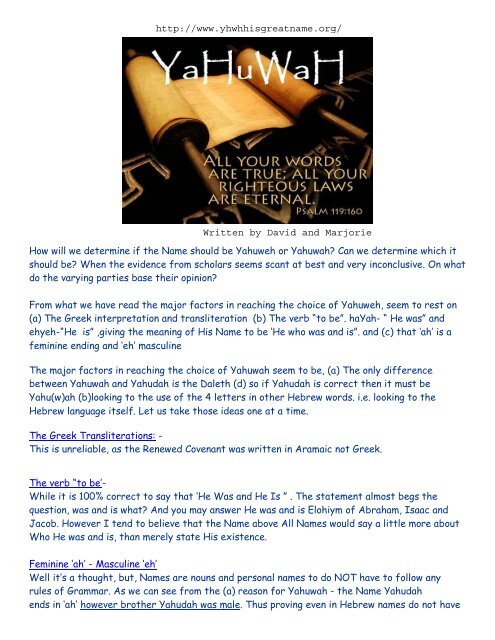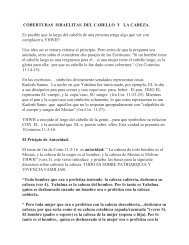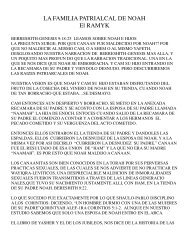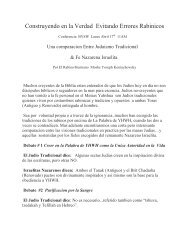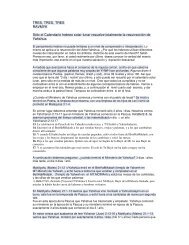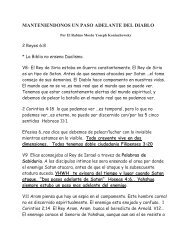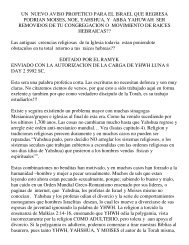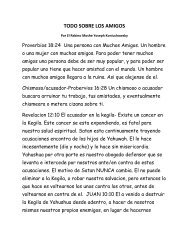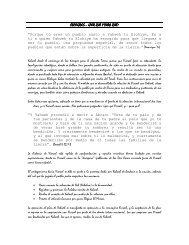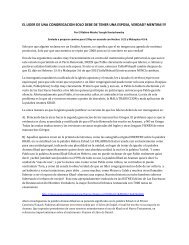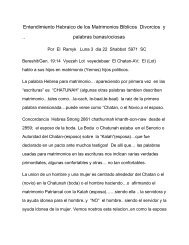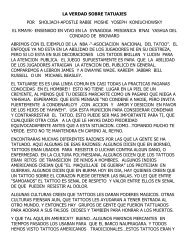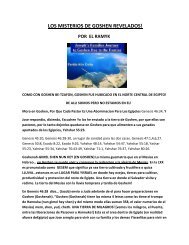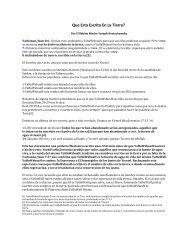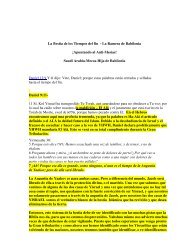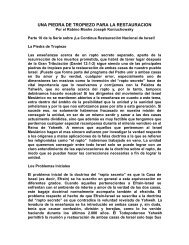How will we determine if the Name should be Yahuweh or Yahuwah ...
How will we determine if the Name should be Yahuweh or Yahuwah ...
How will we determine if the Name should be Yahuweh or Yahuwah ...
You also want an ePaper? Increase the reach of your titles
YUMPU automatically turns print PDFs into web optimized ePapers that Google loves.
<strong>How</strong> <strong>will</strong> <strong>we</strong> <strong>determine</strong> <strong>if</strong> <strong>the</strong> <strong>Name</strong> <strong>should</strong> <strong>be</strong> Yahu<strong>we</strong>h <strong>or</strong> <strong>Yahuwah</strong>? Can <strong>we</strong> <strong>determine</strong> which it<br />
<strong>should</strong> <strong>be</strong>? When <strong>the</strong> evidence from scholars seems scant at <strong>be</strong>st and very inconclusive. On what<br />
do <strong>the</strong> varying parties base <strong>the</strong>ir opinion?<br />
From what <strong>we</strong> have read <strong>the</strong> maj<strong>or</strong> fact<strong>or</strong>s in reaching <strong>the</strong> choice of Yahu<strong>we</strong>h, seem to rest on<br />
(a) The Greek interpretation and transliteration (b) The verb “to <strong>be</strong>”. haYah- “ He was” and<br />
ehyeh-“He is” ,giving <strong>the</strong> meaning of His <strong>Name</strong> to <strong>be</strong> ‘He who was and is”. and (c) that ‘ah’ is a<br />
feminine ending and ‘eh’ masculine<br />
The maj<strong>or</strong> fact<strong>or</strong>s in reaching <strong>the</strong> choice of <strong>Yahuwah</strong> seem to <strong>be</strong>, (a) The only d<strong>if</strong>ference<br />
<strong>be</strong>t<strong>we</strong>en <strong>Yahuwah</strong> and Yahudah is <strong>the</strong> Daleth (d) so <strong>if</strong> Yahudah is c<strong>or</strong>rect <strong>the</strong>n it must <strong>be</strong><br />
Yahu(w)ah (b)looking to <strong>the</strong> use of <strong>the</strong> 4 letters in o<strong>the</strong>r Hebrew w<strong>or</strong>ds. i.e. looking to <strong>the</strong><br />
Hebrew language itself. Let us take those ideas one at a time.<br />
The Greek Transliterations: -<br />
This is unreliable, as <strong>the</strong> Rene<strong>we</strong>d Covenant was written in Aramaic not Greek.<br />
The verb “to <strong>be</strong>’-<br />
While it is 100% c<strong>or</strong>rect to say that ‘He Was and He Is ” . The statement almost <strong>be</strong>gs <strong>the</strong><br />
question, was and is what? And you may ans<strong>we</strong>r He was and is Elohiym of Abraham, Isaac and<br />
Jacob. <strong>How</strong>ever I tend to <strong>be</strong>lieve that <strong>the</strong> <strong>Name</strong> above All <strong>Name</strong>s would say a little m<strong>or</strong>e about<br />
Who He was and is, than merely state His existence.<br />
Feminine ‘ah’ - Masculine ‘eh’<br />
Well it’s a thought, but, <strong>Name</strong>s are nouns and personal names to do NOT have to follow any<br />
rules of Grammar. As <strong>we</strong> can see from <strong>the</strong> (a) reason f<strong>or</strong> <strong>Yahuwah</strong> - <strong>the</strong> <strong>Name</strong> Yahudah<br />
ends in ‘ah’ ho<strong>we</strong>ver bro<strong>the</strong>r Yahudah was male. Thus proving even in Hebrew names do not have
to follow <strong>the</strong> rules of grammar. [ And it is unlikely that those rules of grammar existed in Mosheh’s day]<br />
<strong>Yahuwah</strong> - Yahudah.<br />
The evidence f<strong>or</strong> <strong>Yahuwah</strong> based on Yahudah is good, though hardly conclusive, in and of itself.<br />
O<strong>the</strong>r Hebrew w<strong>or</strong>ds<br />
So to where <strong>will</strong> <strong>we</strong> look f<strong>or</strong> <strong>the</strong> ans<strong>we</strong>r??? It seems a mighty fine idea to look in Scripture and<br />
see <strong>if</strong> <strong>we</strong> can find any clues in <strong>the</strong>re. What does YHWH say about HIS OWN NAME?<br />
Shemoth(Exodus) 3:15<br />
And Elohiym said to Moses again, You shall say this to <strong>the</strong> sons of Israel, YHWH,<strong>the</strong> Elohiym<br />
of your fa<strong>the</strong>rs, <strong>the</strong> Elohiyn of Abraham, <strong>the</strong> Elohiym of Isaac, and <strong>the</strong> Elohiym of Jacob, has<br />
sent me to you. This is My name f<strong>or</strong>ever, and this is My mem<strong>or</strong>ial from generation to generation.<br />
So <strong>the</strong> NAME of YHWH is Yah’s mem<strong>or</strong>ial. Just what is this w<strong>or</strong>d “mem<strong>or</strong>ial” ?<br />
H2143<br />
zeker<br />
BDB Definition:<br />
1) mem<strong>or</strong>ial, remembrance. 1a) remembrance, mem<strong>or</strong>y. 1b) mem<strong>or</strong>ial Part of Speech: noun<br />
masculine<br />
Strongs Definition:<br />
From H2142; a memento, abstractly recollection (rarely <strong>if</strong> ever); by implication commem<strong>or</strong>ation:<br />
- mem<strong>or</strong>ial, mem<strong>or</strong>y, remembrance, scent.<br />
A mem<strong>or</strong>ial as <strong>we</strong> all know commem<strong>or</strong>ates a spec<strong>if</strong>ic event <strong>or</strong> a person known f<strong>or</strong> something<br />
special. We see this same w<strong>or</strong>d used in relation to <strong>the</strong> Set Apart High Sabbath Days. As <strong>we</strong> all<br />
know those days are a mem<strong>or</strong>ial of spec<strong>if</strong>ic events, as <strong>we</strong>ll as a shadow of things to<br />
come.(Col.2:17)<br />
So what event could <strong>the</strong> <strong>Name</strong> YHWH <strong>be</strong> a mem<strong>or</strong>ial of? Obviously it is something<br />
that is “from generation to generation” which many translations render “my mem<strong>or</strong>ial unto all<br />
generations”. By <strong>the</strong> time that Yah said this to Moses <strong>the</strong>re had <strong>be</strong>en a fair few generations<br />
already. So <strong>we</strong> have to go back to <strong>the</strong> <strong>be</strong>ginning to find what it might <strong>be</strong> a mem<strong>or</strong>ial of. In fact<br />
<strong>we</strong> need to go back to <strong>the</strong> <strong>be</strong>ginning of <strong>the</strong> first generation in Bereshith (Genesis) Bereshith<br />
(Genesis) 2:7 And YHWH Elohiym f<strong>or</strong>med man of <strong>the</strong> dust of <strong>the</strong> ground, and brea<strong>the</strong>d into his<br />
nostrils <strong>the</strong> breath of l<strong>if</strong>e; and man <strong>be</strong>came a living soul<br />
We firmly <strong>be</strong>lieve that this is <strong>the</strong> event that Yah’s name is a mem<strong>or</strong>ial of. Remem<strong>be</strong>ring that<br />
what <strong>we</strong> are looking f<strong>or</strong> is from <strong>the</strong> oldest f<strong>or</strong>m of Hebrew., Is <strong>the</strong>re a w<strong>or</strong>d that would<br />
connect with both <strong>the</strong> event and Yah’s <strong>Name</strong>?
H1933 in Strong’s<br />
A primitive root (compare H183, H1961) supposed to mean properly to brea<strong>the</strong>;<br />
to <strong>be</strong> (in <strong>the</strong> sense of existence): - <strong>be</strong>, X have.<br />
Original W<strong>or</strong>d: הָו ָה<br />
Transliteration: hava'<br />
Phonetic Spelling: (haw-vaw')<br />
Sh<strong>or</strong>t Definition: to brea<strong>the</strong><br />
Here <strong>we</strong> have a three letter primitive root w<strong>or</strong>d that means, to brea<strong>the</strong>, and is exactly<br />
<strong>the</strong> last 3 letters of <strong>the</strong> 4 letter tetragrammaton. he only letter missing is <strong>the</strong> first letter. <strong>the</strong><br />
yod Strong’s transliterates this w<strong>or</strong>d as ‘havah” ho<strong>we</strong>ver as <strong>we</strong> have discussed elsewhere<br />
<strong>the</strong>re was no v sound in ancient Hebrew only a “<strong>we</strong>ak’ <strong>or</strong> ‘soft’ “w” sound resulting from <strong>the</strong><br />
vo<strong>we</strong>l ‘u’ <strong>or</strong> ‘oo’. Which would make it “ ha-u w- ah” In Hebrew <strong>the</strong> vo<strong>we</strong>l could <strong>be</strong> ei<strong>the</strong>r side of<br />
<strong>the</strong> consonant but seldom toge<strong>the</strong>r without a consonant sound separating <strong>the</strong>m.<br />
In this case taking ‘Hau w ah” and adding <strong>the</strong> Yod this would <strong>be</strong>come YaHuWaH.<br />
So what would <strong>the</strong> “ yod” infer. The ancient pictogram f<strong>or</strong> <strong>the</strong> yod was YHWH meaning <strong>the</strong> hand<br />
<strong>or</strong> <strong>the</strong> w<strong>or</strong>k. So this would make YHWH to mean, “He w<strong>or</strong>ks Breath” <strong>or</strong> “Giver and Sustainer of<br />
L<strong>if</strong>e”<br />
Bereshith (Genesis) 2:7<br />
And YHWH Elohiym f<strong>or</strong>med man of <strong>the</strong> dust of <strong>the</strong> ground, and brea<strong>the</strong>d into his nostrils <strong>the</strong><br />
breath of l<strong>if</strong>e; and man <strong>be</strong>came a living soul<br />
Shemoth(Exodus) 3:15 (last part)<br />
“........This is My name f<strong>or</strong>ever, and this is My mem<strong>or</strong>ial from generation to generation.”<br />
Can <strong>we</strong> <strong>the</strong>n say that <strong>the</strong> Tetragram stands f<strong>or</strong> YaHuWaH and it simply means<br />
‘giver and sustainer of l<strong>if</strong>e.’ ? <strong>or</strong> simply ‘L<strong>if</strong>e’. Is it possible that <strong>we</strong> can say that <strong>the</strong>re is one<br />
sh<strong>or</strong>t phrase <strong>or</strong> w<strong>or</strong>d, that can contain <strong>the</strong> height, depth and breadth of YHWH in <strong>the</strong> way<br />
that <strong>we</strong> can say, Yeshayahu means “Yah <strong>will</strong> deliver”? Let us consider this fur<strong>the</strong>r.<br />
In John 1 <strong>we</strong> read in reference to Messiah:-<br />
John 1:4 In Him was l<strong>if</strong>e, and <strong>the</strong> l<strong>if</strong>e was <strong>the</strong> light of men;<br />
We fur<strong>the</strong>r <strong>we</strong> read in John 14:-Yohanan (John) 14:10<br />
Do you not <strong>be</strong>lieve that I am in <strong>the</strong> Fa<strong>the</strong>r and <strong>the</strong> Fa<strong>the</strong>r is in Me?<br />
The W<strong>or</strong>ds which I speak to you I do not speak from Myself, but <strong>the</strong> Fa<strong>the</strong>r who abides in<br />
Me, He does <strong>the</strong> w<strong>or</strong>ks*. (*<strong>the</strong> Yode )
So <strong>we</strong> see that <strong>the</strong> Fa<strong>the</strong>r abides in Moshiach and so does L<strong>if</strong>e. Could it <strong>be</strong> that “L<strong>if</strong>e” = The<br />
Fa<strong>the</strong>r. Let us look also at Mattithyahu 28:-<br />
Mattithyahu 28:19<br />
Then having gone, disciple all nations, baptizing <strong>the</strong>m into <strong>the</strong> name of <strong>the</strong> Fa<strong>the</strong>r and of <strong>the</strong><br />
Son and of <strong>the</strong> Ruach Ha Kadosh,<br />
This <strong>Name</strong> <strong>be</strong>longs simultaneously to The Fa<strong>the</strong>r, The Son and <strong>the</strong> Ruach (Spirit)<br />
If <strong>we</strong> <strong>we</strong>re to say that YAH pertains to <strong>the</strong> Fa<strong>the</strong>r as First Cause,<br />
and HU pertains to The Son as “He” who spoke.. ”The W<strong>or</strong>d” that <strong>be</strong>came flesh.<br />
We have <strong>the</strong> Fa<strong>the</strong>r and Son in YAHU. Can <strong>we</strong> find The Ruach Ha Kadosh in <strong>the</strong> final ‘ah’ <strong>or</strong><br />
‘eh’?? Let us look at some Scripture that tells us <strong>the</strong> attributes of <strong>the</strong> Ruach.<br />
The following verses from Yeshayahu tell us of <strong>the</strong> Spirit of YHWH that was to <strong>be</strong> upon<br />
Moshiach<br />
Yeshayahu (Isaiah) 11:2-3<br />
Isa 11:2 And <strong>the</strong> spirit 7307 3068 5117 5921<br />
of shall rest upon him,<br />
<strong>the</strong> spirit 7307 of wisdom 2451 and understanding, 998<br />
<strong>the</strong> spirit 7307 of counsel 6098 and might, 1369<br />
<strong>the</strong> spirit 7307 of knowledge 1847 and of <strong>the</strong> fear 3374 of ; 3068<br />
Isa 11:3 And shall make him of quick understanding 7306<br />
in <strong>the</strong> fear 3374 of : 3068 and he shall not 3808 judge 8199 after <strong>the</strong> sight 4758 of his eyes, 5869<br />
nei<strong>the</strong>r 3808 reprove 3198 after <strong>the</strong> hearing 4926 of his ears: 241<br />
Also in Shemoth (Exodus)31. We see The Ruach given to Betsal’el f<strong>or</strong> special purpose.<br />
Shemoth (Exodus)31.<br />
Exo 31:2 See, 7200 I have called 7121 by name 8034 Betsal’el 1212 <strong>the</strong> son 1121 of Uri, 221<br />
<strong>the</strong> son 1121 of Hur, 2354 of <strong>the</strong> tri<strong>be</strong> 4294 of Yahudah: 3063<br />
Exo 31:3 And I have filled 4390 him with <strong>the</strong> spirit 7307 of Elohiym, 430 in wisdom, 2451 and in<br />
understanding, 8394 and in knowledge, 1847 and in all manner 3605 of w<strong>or</strong>kmanship, 4399<br />
The num<strong>be</strong>rs given in both extracts are from Strong’s; <strong>we</strong> have underlined those w<strong>or</strong>ds<br />
pertaining to <strong>the</strong> attributes of <strong>the</strong> Ruach(Spirit). Let us briefly take a closer look at those<br />
w<strong>or</strong>ds.<br />
Starting with Yeshayahu 11.<br />
Wisdom - H2451 - - chokmah<br />
Understanding - H998--biynah<br />
Counsel - H6098- - ‘etsah
Might - H1369 - - geburah<br />
Knowledge - H1847- - da’ath*<br />
Fear - H3374 - - yir’ah<br />
From Shemoth (Exodus)31:2-3 <strong>we</strong> add:-<br />
Understanding - H8394 - - tebunah<br />
W<strong>or</strong>kmanship - H4399- -m e la’kah<br />
From those Scriptures <strong>we</strong> see that with only one exception* all <strong>the</strong> Hebrew w<strong>or</strong>d end with<br />
“ah”<br />
Also from Tehillim (Psalms) 119 <strong>we</strong> see:-<br />
Psa 119:40 Behold, 2009 I have longed 8373 after thy precepts: 6490 quicken 2421 me in thy<br />
righteousness. 6666<br />
The w<strong>or</strong>d translated “quicken” H2421 is YHWH ‘chayah’ and variously translated as; quicken,<br />
live, lived, alive, save, l<strong>if</strong>e, revive, saved, recover, preserve, rest<strong>or</strong>ed, and a num<strong>be</strong>r of o<strong>the</strong>r<br />
w<strong>or</strong>ds that all pertain to <strong>be</strong> quickened by <strong>the</strong> Ruach (Spirit). Also from <strong>the</strong> same verse, <strong>we</strong> see<br />
<strong>the</strong> w<strong>or</strong>d “righteousness” H6666 “ts e daqah”<br />
Let us look at just one m<strong>or</strong>e scripture in relation to this:-<br />
Tehillim (Psalms)40:10<br />
I have not 3808 hid 3680 thy righteousness 6666 within 8432 my heart; 3820 I have declared 559 thy<br />
faithfulness 530 and thy salvation: 8668 I have not 3808 concealed 3582 thy lovingkindness 2617 and thy<br />
truth 571 from <strong>the</strong> great 7227 congregation. 6951<br />
We see here <strong>the</strong> two w<strong>or</strong>ds ‘faithfulness’ and ‘salvation’. Faithfulness - H530- - emunah<br />
Salvation- H8668- -t e shu’ah<br />
By now <strong>we</strong> have made <strong>the</strong> point that, in looking to <strong>the</strong> Hebrew w<strong>or</strong>ds pertaining to<br />
<strong>the</strong> Ruach - <strong>we</strong> see that <strong>the</strong> vast maj<strong>or</strong>ity end in ‘ah’ while none give an ‘eh’.<br />
It is only by looking to <strong>the</strong> Greek, that <strong>we</strong> can find any evidence that our Elohiym<br />
has a <strong>Name</strong>, that ends in ‘eh’. While clearly <strong>the</strong>re is ample evidence from <strong>the</strong> Hebrew<br />
that <strong>if</strong> YaH <strong>be</strong>longs to <strong>the</strong> Fa<strong>the</strong>r and HuW to <strong>the</strong> Son, <strong>the</strong>n certainly aH <strong>be</strong>longs to <strong>the</strong> Ruach<br />
giving <strong>the</strong> name to <strong>be</strong> YaHuWaH. (Yahuah) YHWH <strong>or</strong> <strong>if</strong> you prefer - EAUA 4 Vo<strong>we</strong>ls.<br />
Bef<strong>or</strong>e <strong>we</strong> close this study f<strong>or</strong> <strong>the</strong> moment, let us examine one m<strong>or</strong>e way to view this.<br />
In Bereshith (genesis)3:20<br />
And Adam 121 called 7121 his w<strong>if</strong>e's 802 name 8034 Eve; 2332 <strong>be</strong>cause 3588 she 1931 was 1961
<strong>the</strong> mo<strong>the</strong>r 517 of all 3605 living. 2416<br />
Let us look at <strong>the</strong> name of “Eve” H2332 Chawaah transliterated by Strong’s as “Chavvah”.<br />
As <strong>we</strong> have seen <strong>the</strong>re was no ‘v’, so this would m<strong>or</strong>e c<strong>or</strong>rectly <strong>be</strong> transliterated as Chawwah,<br />
<strong>or</strong> as ‘The Scriptures’ translation has it “Hawwah”. We see that <strong>the</strong> reason Adam<br />
called his w<strong>if</strong>e this was <strong>be</strong>cause she was <strong>the</strong> mo<strong>the</strong>r of all living. <strong>How</strong>ever <strong>we</strong> have<br />
already seen <strong>the</strong>se three letters; reading from right to left “- chet, waw, hey- in <strong>the</strong> w<strong>or</strong>d<br />
translated ‘quicken’ in Tehillim119:40 . Exactly <strong>the</strong> same letters in <strong>the</strong> same <strong>or</strong>der<br />
and rec<strong>or</strong>ded as H2421 transliterated “chayah”<br />
Consider also <strong>the</strong> letter “waw”- - that <strong>we</strong> have seen and associated with HU, <strong>the</strong> “waw” is used<br />
in <strong>the</strong> Hebrew, as our English w<strong>or</strong>d ‘and’. A nail <strong>or</strong> peg (<strong>the</strong> picture f<strong>or</strong> waw) joins to things<br />
toge<strong>the</strong>r.<br />
Many of <strong>the</strong> qualities of <strong>the</strong> Ruach are considered feminine, Solomon refers to Wisdom<br />
as feminine. Let us consider also that when Elohiym made man in His own image. He<br />
first made Adam complete in His image. Then took “a part of” His image, from Adam,<br />
to create Hawwah.<br />
It takes both a man (male aspect) and a woman (female aspect) to join toge<strong>the</strong>r to create a son.<br />
So could <strong>we</strong> say YAH (male aspect) joined to WAH (female aspect) by HUW (<strong>the</strong>” waw” <strong>or</strong> nail)<br />
Fa<strong>the</strong>r Son Mo<strong>the</strong>r YAH HUW WAH merged toge<strong>the</strong>r making YaHuWaH complete. Or <strong>if</strong><br />
you prefer to think of it this way:-Mind-Fa<strong>the</strong>r Body-Yahshua Spirit-Ruach-Binah etc.<br />
YAH HUW WAH once again merged toge<strong>the</strong>r as YaHuWaH complete. We need The Mind<br />
that was in Messiah to <strong>be</strong> in us - <strong>the</strong> Mind of <strong>the</strong> Fa<strong>the</strong>r(Philippians 2:5)<br />
We need <strong>the</strong> shed blood from The Body of Messiah f<strong>or</strong> <strong>the</strong> f<strong>or</strong>giveness of our sins.<br />
We need The Spirit, The Ruach Ha Kadosh to lead us in Truth and Wisdom without The Ruach<br />
<strong>we</strong> have no Eternal LIFE. We need YaHuWah - Complete in us, f<strong>or</strong> ourselves to <strong>be</strong> Complete.<br />
YAHUWAH -------- HE IS LIFE.


